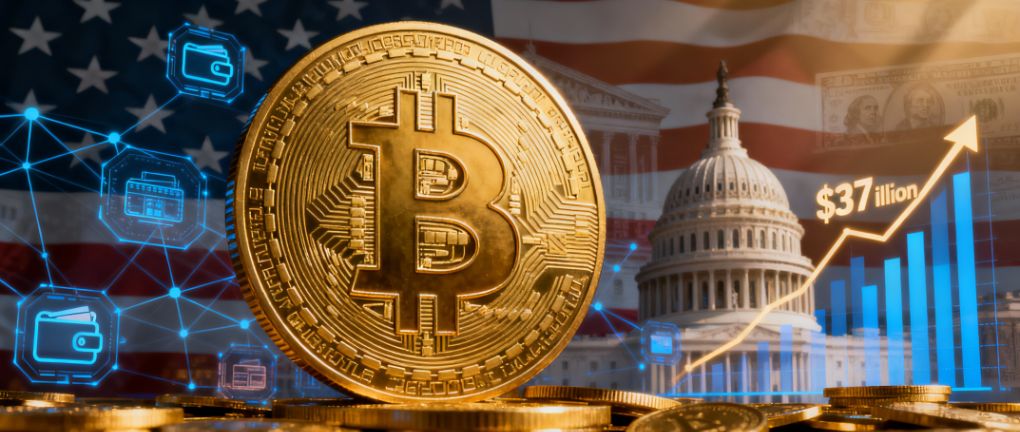When 127,000 bitcoins were transferred from the vaults of a Cambodian scam syndicate to the digital wallet of the U.S. government, it was not only a victory for law enforcement, but also a quiet shift in global financial power.
"The United States is building the world's largest strategic bitcoin reserve, not by purchasing, but through law enforcement." In October 2025, as the U.S. Department of Justice completed the asset forfeiture in the Cambodian Prince Group case, this news sent shockwaves through the crypto world.
The 127,271 bitcoins seized this time, combined with the previously held approximately 197,000, brought the total U.S. government bitcoin holdings to about 325,000, worth over $37 billion, a figure that even surpasses the gold reserves of most countries.

01 National Strategy: From Temporary Liquidation to Long-term Reserve
U.S. Treasury Secretary Scott Besant officially confirmed that the U.S. government has become one of the largest bitcoin holders in the world. This statement marks a historic shift in the U.S. attitude toward cryptocurrencies.
Formation of the Strategic Reserve
● In March 2025, President Trump issued an executive order establishing a strategic bitcoin reserve, which significantly changed the way the government stores confiscated cryptocurrencies in federal actions. It consolidated the previously scattered storage across multiple agencies into a central reserve system.
● The U.S. bitcoin portfolio was built entirely through law enforcement seizures and asset forfeitures, not direct purchases. As of March 2025, the government held about 207,000 bitcoins, valued at approximately $17 billion.
Policy Turning Point
The policy change stemmed from the realization that selling bitcoin too early had cost U.S. taxpayers billions of dollars in unrealized gains.
● Besant made it clear that the government will no longer sell its existing bitcoin holdings, but will also not use taxpayer funds to purchase more bitcoin.
● The Treasury Department pledged to explore a "budget-neutral path" to increase bitcoin holdings, indicating that new financing mechanisms may be introduced in the future that would not directly impact federal spending.
02 Massive Seizure: Key Details of the Prince Group Case
In October 2025, the U.S. Department of Justice filed criminal charges against Cambodia's Prince Group and its founder Chen Zhi, seizing 127,271 bitcoins, which are now worth as much as $16 billion.
Criminal Network Structure
● The Prince Group, led by Chen Zhi, was involved in online investment scams such as "pig butchering," forced labor, and money laundering, with amounts involved exceeding $16 billion.
● The U.S. Treasury Department's Office of Foreign Assets Control imposed sanctions on the group and its 146 targets, including affiliated companies and key executives.
● Chen Zhi and his gang built and operated at least ten scam-focused compounds across Cambodia, imprisoning laborers lured by false job promises.
Bitcoin and Criminal Activity
● These approximately 127,000 bitcoins were the proceeds and criminal tools of the Prince Group's scams and money laundering, previously stored in non-custodial crypto wallets with private keys held by Chen Zhi. The U.S. Department of Justice filed a civil forfeiture lawsuit, and these bitcoins are now held in custody by the U.S. government.
● Blockchain data analysis shows that these bitcoins may be the same funds stolen from the Chinese crypto mining company "Lubian" in 2020.
03 Market Impact: From Selling Pressure to Structural Change
The U.S. announcement to retain rather than sell its bitcoin holdings quickly eased significant selling pressure in the crypto market. This move effectively eliminated over $17 billion in potential sell pressure.
Market Price Trends
After Besant stated that the U.S. government would not make new purchases, bitcoin prices briefly fell, but quickly stabilized as traders digested the commitment to maintain current holdings.
As of mid-October 2025, the cryptocurrency market showed the following trends:
Cryptocurrency | Price (USD) | 24h Change |
BTC | 113,028 | -2.00% |
ETH | 43,985.61 | -3.39% |
BNB | 1,162.02 | -3.7% |
SOL | 193.84 | -4.25% |
XRP | 2.51 | -3.69% |
Market Structure Changes
● The U.S. government currently controls over 197,000 bitcoins, worth about $17.3 billion, so this move effectively eliminated more than $17 billion in sell pressure.
● Decentralized perpetual contract exchange volumes have surged, driven by multiple factors including regulatory scrutiny and zero-fee trading.
04 Regulatory Framework: From Loose to Systematic
The actions of the U.S. government are accompanied by a regulatory framework that is taking shape, providing clearer direction for digital assets.
National-level Regulatory Progress
● New York City Mayor Eric Adams signed an executive order establishing the nation's first "Office of Digital Assets and Blockchain," aiming to coordinate cooperation between the crypto industry and the government.
● The Governor of California signed a new bill to protect unclaimed crypto assets, prohibiting the forced liquidation of unclaimed crypto assets.
● Republican members of the U.S. House of Representatives proposed the "Retirement Investment Choice Act," aiming to legislate President Trump's executive order allowing 401(k) retirement plans to invest in cryptocurrencies.
Law Enforcement and Judicial Innovation
● The U.S. jurisdiction over the Prince Group case is based on the principle of "long-arm jurisdiction", meaning U.S. courts exercise jurisdiction over overseas conduct with "minimum contacts" with the United States.
● The successful crackdown on the Prince Group case was largely due to advances in blockchain analytics technology. U.S. law enforcement used advanced on-chain analysis tools to trace the flow of funds on the blockchain, ultimately locking down the involved wallets.
05 Global Impact: The Domino Effect of Strategic Reserves
The U.S. bitcoin strategic reserve policy is having a broad international impact.
● Treasury Secretary Besant's disclosure of the U.S.'s $17 billion bitcoin holdings marks a significant turning point in government cryptocurrency policy.
● By agreeing to retain seized digital assets instead of liquidating them, the U.S. has effectively acknowledged the long-term value of bitcoin.
● Besant confirmed that multiple governments have indicated plans to investigate similar reserves, recognizing that digital assets may become an increasingly critical component of national finances in the 21st century.
● The UK also announced sanctions against the Prince Group and related entities, freezing London commercial assets and properties allegedly linked to Chen Zhi.
● Japan will introduce new regulations to ban crypto insider trading, showing that global regulators are strengthening oversight of the crypto market.
06 Future Outlook: A New Era of Sovereign Digital Currency Reserves
● Senator Cynthia Lummis stated that the U.S. seizure of about 127,000 bitcoins from the "Prince Group" highlights two urgent tasks for Congress:
First, to pass digital asset market structure legislation as soon as possible, enabling law enforcement to combat illegal activities while protecting innovation;
Second, to clarify the storage, return, and intergenerational protection of seized bitcoin, turning criminal proceeds into national assets that strengthen the U.S. strategic bitcoin reserve.
● The U.S. government's bitcoin reserve policy may be just the beginning. The Treasury Department has pledged to explore a "budget-neutral path" to purchase more bitcoin.
● This suggests that future policy iterations may introduce new financing mechanisms that do not directly impact federal spending, providing more flexibility for the U.S. digital asset strategy.

